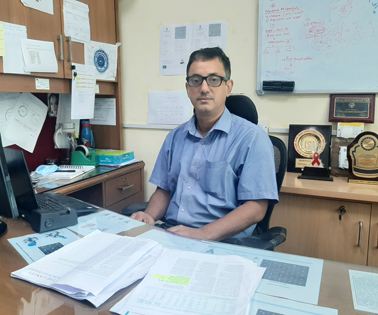November 17, 2022
Meet the IAVI scientist who leads the team that is the first from an LMIC to report potent monoclonal neutralizing antibodies against SARS-CoV-2
Jayanta Bhattacharya, Ph.D., director, Antibody Translational Research Program and principal investigator, Translational Health Science and Technology Institute

What is the focus of your work most recently?
The focus on our work at the Antibody Translational Research Program (ATRP), most recently, is in continuation of our work on HIV. This is what we have been working on for years and will continue to do. But, more recently with the SARS-CoV-2 pandemic, we are leveraging these years of learnings from HIV and thinking about how to apply them to other disease areas, particularly in emerging infectious diseases. This is an exciting time to showcase our expertise and how it can be applied to bettering the response to various diseases especially in low- and middle-income countries (LMICs). For instance, most of our experiments use samples from this part of the world, such as projects related to respiratory syncytial virus (RSV), or antivenom for the snakebite program. We also help with capacity development of scientists from institutes working on these disease domains in India and Africa, for instance in areas where snakebite is endemic.
Why is your work unique/important within the global health research and development landscape?
India and Africa face major challenges in the sphere of global health. Therefore, anything and everything that we do and want to do is towards informing the development of prevention products that are relevant to these contexts, which in turn can truly help those most vulnerable. The kind of work we do is integrated work; it is unique in the sense that when we say we do basic science research it is towards transmission research.
We work with clinicians, epidemiologists, basic scientists, etc., from other institutions to fill the gaps in knowledge/capacity that we do not have. We do not have any boundary in this regard, and HIV is an example of how we are leveraging the unique partnerships that we have built over years, not only for HIV research R&D but also for COVID, and that’s the uniqueness of the ATRP. And, of course, that’s aligned with the global research and development landscape at IAVI and the world currently. Another unique area we are working in is antibody research, specifically to understand the landscape of antibody responses to vaccines. Antibody responses in the course of natural infections is what is essentially informing our work to understand what could be modulated and engineered using the tools and technologies that we have in place to develop antibodies as products for future prevention.
What is the one thing you would want people to walk away remembering about your research?
Working in India, it is rare to find people working collaboratively; people work in silos, especially laboratories. Building partnerships which complement each other — in India, between LMICs and globally — to enhance our ability to respond to any situation that may come is something I want people to remember. We have those rich partnerships in place already — we work closely with the Indian government, non-profit organizations, etc. We also learn from each other every day as a multidisciplinary team. Having people from different backgrounds and expertise under one roof is always enriching, valuable, and humbling.
Who has been an important influence in your work?
Honestly, I think my greatest influence has been the people who I work with. It would be easy to say mentors, and I have lot of different mentors whom I am thankful to, but the people who I work with, directly and indirectly, I think they are the most important people, and I still have so much to learn from them.
What is one thing people would be surprised to know about you?
I can’t say research, because I do not only do those things in my free time [laughs]. I do explore, I do study, but it is not about reading or writing as such. I would not call it my hobby, rather a passion about learning more about different aspects of children on the autism spectrum and what are the areas that people are working on, globally, to improve.
I have a son with special needs, and, although I do research because it comes with its own challenges and I need to do research to understand my child better, especially in stressful situations, it also helps me think outside of the box in my own work. Like, how do you place things when they are outside of the realm of your own understanding? How does this affect my ability to listen, teach, and mentor? This research is more than a responsibility to my own family, it is something I find incredibly interesting; for instance, there are documentaries and movies (have you seen “Forrest Gump”?) about people on the autism spectrum, and they talk about all these unique talents they have with regards to numbers, music etc. How do they do it? I also always want to do more research on policies, be it education or health-related policies, to gain information and understand different perspectives, understand how my family’s experiences are similar and different, and gain insights into why and how certain things are the way they are.